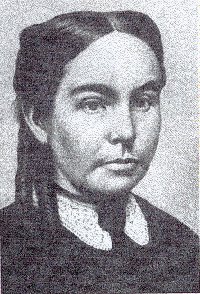Biography of Julia Wheelock
(1833 - 1900)
 Julia Susan Wheelock,
teacher, author, and heroine of the Civil War was born
in Avon, Ohio, on October 7, 1833, the seventh child of Alden and Elsie (Morey) Wheelock.
In her time, she was referred to as "The Florence Nightingale of Michigan"; a
tribute to her efforts tending wounded Civil War soldiers. She kept a well written diary
of her Civil War experiences that serves as a captivating chronicle of the war and her
times. The diary is part of the Civil War collection housed in the Lincoln Museum of
Lincoln Memorial University (LMU).
Julia Susan Wheelock,
teacher, author, and heroine of the Civil War was born
in Avon, Ohio, on October 7, 1833, the seventh child of Alden and Elsie (Morey) Wheelock.
In her time, she was referred to as "The Florence Nightingale of Michigan"; a
tribute to her efforts tending wounded Civil War soldiers. She kept a well written diary
of her Civil War experiences that serves as a captivating chronicle of the war and her
times. The diary is part of the Civil War collection housed in the Lincoln Museum of
Lincoln Memorial University (LMU).
When Julia was four, her father moved the family from Ohio to Erie, Pennsylvania. Her father died when she was 11 years old, and her mother when she was 21. After her mother died, Julia moved to Michigan to be near her brothers Orville and Chapin. In 1858, she entered Kalamazoo College, majoring in Latin and higher Math. Upon graduation, she began teaching.
Julia's story as a courageous participant in the Civil War begins in 1861, when her brother, Orville, enlisted. On September 23, 1861 he was mustered into Company K, Eigth Michigan Infantry. After a brief assignment as a recruiter in Detroit, he was sent to Washington, DC, with his regiment. The Eight Michigan Infantry saw action in September of 1862 at the Battle of Chantilly, Orville's first battle. He was seriously wounded during the encounter, loosing his left leg.
Julia was preparing for the new school year when a messenger delivered word of her brothers condition. She started her diary that day (September 10, 1862) with this entry:
"At 1/2 past 8 o'clock Tinie Stone called and wished to see me: I went to the door, when she informed me, that brother Orville was seriously wounded the first day of Sept. in the battle near Centerville, that he lay several days on the field, had his left limb amputated -- but was finally taken to a hospital in Alexandria, Va."
The next day Julia set out for Washington, DC, to the aid of her brother. Anna, Orville's wife, and her sister, Sarah, both accompanied Julia on her journey. In two days they arrived and immediately began looking for Orville among the wounded and dying in the hospitals of Washington. During her search Julia befriended Elmina Brainard, a nurse from Michigan who had come to attend to the wounded soldiers of the Seventh Michigan Infantry. She and Elmina became close friends and would work together throughout the Civil War.
On September 14, 1862, Julia, Anna, and Sarah were told that Orville had been seen in a hospital in Alexandria, Virginia. When they arrived, they went first to the Southern Methodist Hospital, and then to the Lyceum, where they were told that Orville was just across the street, at the Baptist Church hospital. They started across the street, but were called back and told that Orville was at the Lyceum, and was doing fine.
But hope quickly turned to despair when they were met at the door, and told that Orville had died on September 9, 1862, and had been buried the next day in grave 207 at the soldiers cemetery in Alexandria (now the Alexandria National Cemetery).
The grief stricken women were taken to the cemetery by Clara Jones, the nurse who attended to Orville in his final hours. Clara greatly impressed Julia with her account of Orville's sickness.
Several days later, Anna and Sarah left for Michigan; but Julia stayed behind and visited hospitals with her new friend, Elmina. By the end of September, both had been appointed visiting agents of the Michigan Relief Association.
Julia's duties during this period were to administer to the sick, wounded, and dying soldiers; with an emphasis on those from Michigan. She would assist the nurses, help feed the soldiers, write letters home for those unable to do so themselves, and provide moral support for those who might not live to see the morrow.
Julia's diaries are filled with accounts of anguish and suffering. She worked for up to twelve hours a day, caring for the wounded and dying, after which she would return to her Alexandria boarding and bake pies to take to the soldiers the next day.
Julia fought to improve the conditions of the warehouses and churches that were used to house the wounded. They were often dirty and unsanitary. She felt that they were looked upon as repositories for the dying rather than houses of healing.
In time, Julia's kindness and hard work became well known amongst the soldiers. She was paid five dollars a week, funded with donations by the people of Michigan.
She occassionally did some sightseeing. Her diary has stories of visits to the Capitol, Mt. Vernon, and Christ Church in Alexandria, where she wrote about running her hand over the pew that George Washington sat in.
During a speech, given by Andrew Johnson, she saw Abraham Lincoln, and his young son, accompanied by members of his cabinet. She met Ulysses S. Grant, in 1864, during one of her visits to the front.
She writes at length of Lincoln's assasination. She visited Lincoln lying in state at both the White House and the Capitol. The following is her account:
"The windows, mantle & walls were heavioy draped in black. In the middle of the room on a platform covered with black sat the coffin which was beautiful beyond description. A wreath of white flowers and green leaves lay all around the coffin & overhead was a canopy of black. There in the cold embrace of death lay the Chief Magistrate of our country - a placid smile was upon his countenance. It seemed he must only be sleeping, that he would soon awake, but alas! he sleeps the sleep that knows no waking."
Julia's work with the Michigan Relief association ended in July 1865. She stayed in Washington, working at the Treasury Department, until 1873, when she returned to Michigan.
She married Porter C. Freeman, of Middleville, Michigan, on May 18, 1873. The couple lived in Middleville, where they had two sons, Frank Wheelock Freeman, born 1876, and Frederick Orville Freeman, born 1879. The family later moved to Springfield, Missouri, where Frank died at the young age of 14. Fred became a geologist and oil operator.
Julia wrote "Boys in White, Experiences of a Hospital Agent in and Around Washington" while in Middleville. The book described her wartime experiences. It sold reasonably well, and received good reviews.
In 1890, Julia was granted a pension of 12 dollars a month for her service during the war. A document, issued by the House of Representatives stated, "Julia Wheelock was a brave woman, a patriot in the highest sense of the term."
She died on June 7, 1900, at the age of sixty six. She was buried next to her son, Frank, in the Hazlewood Cemetery, in Sprinfield, Mo. Today, the site overlooks the Springfield National Cemetery.
In Oct 2002 she received a post-humous award from the Michigan Women's Hall of Fame, for her selfless, tireless efforts during the Civil War. The award, presented by Dr. Weldon Petz, was received on her behalf by Bonnie Bergeron, a gg-niece.
Written by Roderick B. Sullivan, May 1999, updated Jan 2015
Notes and Sources
- "Michigan's Florence Nightengale", by Weldon Petz, published in the July/Aug 1998 issue of Michingan History 82, pages 67-74.
- "In Bonnet and Shawl, Adventures of a Michigan Relief Agent During the Civil War", by Frances Davis McTeer, published in Michigan Women in the Civil War (Lansing: Michigan Civil War Centennial Observance Commission, 1963), pages 64-84.
- "Julia Susan Wheelock: The Florence Nightingale of Michigan During the Civil War", by Robert K. Kincaid, published in Lincon Herald 46 (October 1944): pages 42-48.
- "Our Boys in White: The Experiences of a Hospital Agent in and around Washington", by Julia S. Wheelock, NY, 1870.
- "Diary of Julia S. Wheelock, 1862-1867", Civil War Collection, Lincoln Museum, Lincoln Memorial University.
- Records of Bonnie Bergeron.
